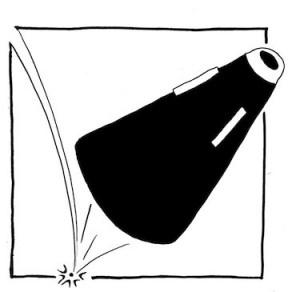 Several years ago, Peter Schickele (well known for his “discovery” of P.D.Q. Bach) created a radio program for Public Radio International called “Schickele Mix”. The show’s motto was a quote from Duke Ellington: If it sounds good, it is good. Over more than 175 episodes, Schickele explored the connections between almost every genre of western music. For example, his first show contained music of Praetorius, Mozart, Chopin, Webern, Gershwin, Glass, Lennon and McCartney, Lennie Tristano, Elton John, Harlan Howard, Sonny Throckmorton, Brent Maher, and Harold Arlen.
Several years ago, Peter Schickele (well known for his “discovery” of P.D.Q. Bach) created a radio program for Public Radio International called “Schickele Mix”. The show’s motto was a quote from Duke Ellington: If it sounds good, it is good. Over more than 175 episodes, Schickele explored the connections between almost every genre of western music. For example, his first show contained music of Praetorius, Mozart, Chopin, Webern, Gershwin, Glass, Lennon and McCartney, Lennie Tristano, Elton John, Harlan Howard, Sonny Throckmorton, Brent Maher, and Harold Arlen.
This wonderful program, and the ecumenical spirit it embodied, were on my mind when I recently encountered an internet meme. This meme features a photograph of a very narrow upright piano (with only three white keys and two black ones). The different variations of the meme all have a caption that reads “Special piano for composing hip-hop and rap”, or something similar. When I’ve seen this meme posted on Facebook, it’s typically accompanied by commentary which will more explicitly deride these (and other) forms of music, often denying them the very label of “music”.
I don’t tend to listen to hip-hop or rap any more than I do country music or teen pop. (Well, I do on occasion listen to teen pop, but I have teenagers who know how to work the media controls in my car.) I also don’t care for okra, though I recognize it is a vegetable, and I acknowledge that many people find it delectable. The desire to listen to music is a universal human characteristic, one that rekindles people’s belief in humanity. The impulse to denigrate the class of art that someone else enjoys, by contrast, plays to the basest elements of human nature.
Perhaps the food metaphor might be usefully extended: that fennel and celeriac salad with dill and white truffle oil you brought certainly looks delicious, and perhaps it is more sophisticated with a more complex and delicate flavor than my mashed potatoes, or my friend’s Cajun red beans and rice. But would you really consider asserting so, publicly? And who in the room would respect you if you did? Can’t we derive pleasure from all the food at the table, each in his or her own way?
I am not suggesting that symphony orchestras should abandon the canon and start programming only cross-over concerts with hip-hop artists—although in my neighborhood the National Symphony Orchestra recently had two very successful concerts with Nas and Kendrick Lamar. But we should always be seeking to bring our music to new audiences. And fairly or not, our music is widely perceived as elitist in the worst sense of that word. Ultimately a message of “your music is terrible, come listen to mine” is not very appealing.
The Governing Board has for several years been urging a strategy of advocacy—for our orchestras and for our art form. But it would be a grave mistake to speak for our art form at the expense of others, just as it would be wrong to laud one orchestra at the expense of another. As symphonic musicians, we are (or we should be) constantly striving to grow our audience, but it is a failing strategy to do so by denigrating other forms of music. Instead, we should be advocating for live music in all its forms. Ultimately, it is the paradigm of attending concerts that we should be nurturing. A culture in which live music in all its varieties is appreciated, supported, and valued is a culture that will maintain thriving orchestras.
Dropping the Mute
Issue: December 2015





